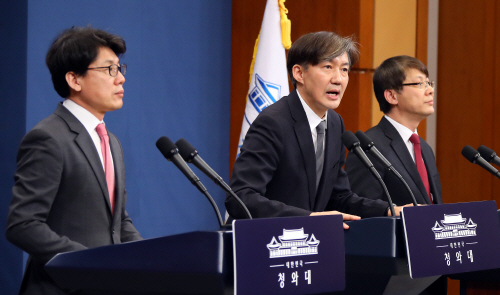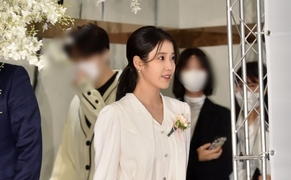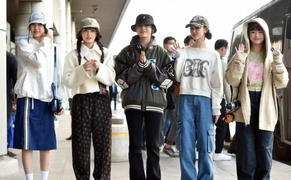 |
| Cho Kuk, senior presidential secretary for civil affairs, explains the content and background of the government proposal for a constitutional revision during a press briefing at the presidential office Cheong Wa Dae on Tuesday. (From left) Jin Sung-joon, presidential secretary for political affairs, Cho Kuk, senior presidential secretary for civil affairs, and Kim Hyeong-yeon, presidential secretary for legal affairs. / Source: Yonhap News |
By AsiaToday reporter Joo Sung-sik
The democratic ideologies of the Busan-Masan Democratic Protests in 1979, the May 18 Gwangju Democratic Uprising in 1980, the 1987 June Democratic Uprising are newly specified in the preamble of the Constitution proposed by President Moon Jae-in alongside the April Revolution in 1960, which will be submitted to the National Assembly next week. The revision bill replaced the term "citizens" with "people" while the term "worker", which was made in the era of Japanese colonial rule, was replaced with "laborer". The bill strengthened workers' right of collective action, partly including civil servants, and imposed on the government the duty of guaranteeing the people's right to life, safety, and basic information. It also includes a national recall system to strengthen the sovereignty of the people.
Cheong Wa Dae revealed Tuesday the preamble to the new Constitution and revisions to enhance basic rights, with Cho Kuk, senior presidential secretary for civil affairs, Jin Sung-joon, presidential secretary for political affairs, and Kim Hyeong-yeon, presidential secretary for legal affairs, in attendance. The announcement came after President Moon Jae-in ordered the government to explain the purpose and details of the proposal to the people before submitting to the National Assembly on March 26.
Cho explained the purpose of the presidential constitutional amendment proposal, saying, "Nearly thirty years have passed since the Constitution was changed through the 1987 June Democratic Uprising. Since then, the lives of the people changed drastically with the IMF bailout and the Sewol tragedy, and the people's call for a new Republic of Korea grew further following the candlelight protests and the presidential impeachment."
The first part of the government's Constitution amendment bill was about the Constitution's preamble and basic rights, which seeks to expand the rights of the people by guaranteeing quality of life, freedom, and safety of the people, as well as expanding direct democracy. While the current preamble only marks the significance of the April Revolution in 1960, the proposed bill includes the democratic ideologies of the Busan-Masan Democratic Protests in 1979, the May 18 Gwangju Democratic Uprising in 1980, and the 1987 June Democratic Uprising. However, the candlelight revolution is not included in the preamble because it is still ongoing.
The basic rights of the people stipulated in the current Constitution have also significantly improved. Most of all, the subject of basic human rights has expanded to people from citizens. It reflects the level of human rights the international community expects from South Korea as well as more than 2 million foreign residents in our society. The basic rights of laborers have been also drastically strengthened for the purpose of fair treatment, resolution of polarization, and sustainable growth. In addition, new rights the government proposes to add include rights to life, rights to safety, as well as basic information right.
On the other hand, the bill removed clauses deemed irrational including those restricting soldiers and others defined by law from seeking compensation from the state. The bill introduced a new system for recall elections of lawmakers and a system to allow the public submission of bills.
"This constitutional amendment is a people-centered amendment that strengthens basic rights and the people's sovereignty," Cho said. Cheong Wa Dae is set to release additional details of its proposal for a constitutional revision over the next two days.
#constitution #amendment #proposal #bill #Moon Jae-in
Copyright by Asiatoday
Most Read
-
1
-
2
-
3
-
4
-
5
-
6
-
7





















